This article was co-authored by Jennifer Butler, MSW. Jennifer Butler is a Love & Transformation Coach and the Owner of JennJoyCoaching, a life coaching business based in Miami, Florida, although Jennifer works with clients all over the world. Jennifer’s work centers around empowering women who are navigating any stage of the divorce or breakup process. She has over four years of life coaching experience. She is also the co-host of the Deep Chats Podcast along with Leah Morris and the host of season 2 “Divorce and Other Things You Can Handle” by Worthy. Her work has been featured in ESME, DivorceForce, and Divorced Girl Smiling. She received her Masters of Social Work (MSW) from New York University. She is also a Certified Health Coach, a Communications & Life Mastery Specialist, and a Certified Conscious Uncoupling and Calling in “the One” coach.
There are 9 references cited in this article, which can be found at the bottom of the page.
This article has been viewed 70,034 times.
Weight gain is a normal human process. In fact, science shows us that most people naturally weigh less during the weekdays and more throughout the weekend. However, sometimes weight gain is much more than a small fluctuation, making a significant difference in how you look and feel. You might worry about what your partner will think about weight gain, or worry that potential dates won't find you attractive. If recent weight gain is making you insecure, you must learn to eliminate your negative self-talk and build a healthier body image to finally feel comfortable in your own skin.
Steps
Quieting the Negative Voice
-
1Recognize how negative self-talk affects you. The things you repeat to yourself throughout a day can have an overwhelming impact on your mood. If you are feeling insecure about your weight gain, it may not be because of anything someone said to you, but is, instead, driven by what you're saying to yourself about your weight.[1]
- Some self-talk is practical like "I need to get my homework done early" while other statements may be shaming or self-defeating like "I'm so fat. I should be in the gym all day long".[2]
-
2Listen to your self-talk. Once you realize that some aspects of your internal voice may be contributing to your body insecurity, it's time to pay closer attention to these thoughts. Negative self-talk reinforces itself and creates your reality. The only way to stop it is to become aware of it.[3]
- Spend a few minutes each day tuning in to your thoughts, particularly when it comes to your body. Maybe you can tune in when you are getting dressed in the mirror or when you are preparing a meal.
- What kinds of thoughts are going through your head about yourself. Do these thoughts build you up and make you feel positive or are they making you feel worse about yourself?
Advertisement -
3Challenge these messages. In order to improve your self-talk, you must attack those statements which are unhelpful or unrealistic.[4] Using the statement "I should be in the gym all day long", let's challenge this self-talk by:
- Reality testing: What evidence is there for or against it? Since this statement is very extreme, you are unlikely to find any evidence that supports the idea that you should be in the gym all day. However, you can find evidence that says working out for too long can cause injuries or exhaustion that makes it even harder to lose weight. Overdoing it won't help you lose weight.
- Goal-directed thinking: Is thinking this way solving my problem? No, telling yourself what you should be doing is punishment not a solution. A better way of helping yourself solve the problem is by simply saying "I would like to make the effort and visit the gym today".
-
4Develop healthier affirmations. Rather than feeding into the nonstop self-criticism make an intentional choice to supply yourself with positive, life-giving thoughts.
- For example, rather than telling yourself "I am fat. I should be in the gym all day long" you could simply write down on a sticky note to post on your mirror (or in your bag or car) words that prompt you to feel more confident about yourself. These might be "Strong. Beautiful. Caring." Seeing these words as you go about your day will help you to project these traits instead of projecting insecurity.[5]
Being Body Positive
-
1Build a self-esteem file. Consider this the collection of personal attributes that give you a warm and fuzzy feeling. Actively fight your insecurities by writing down and reflecting on all the wonderful things you and others have said about you.
- These traits can be about your appearance - "You have gorgeous eyes" or "Your clothing choices are always well thought out" - or about other personal characteristics like being a good listener or always anticipating when others need a helping hand.
- Supplement your own ideas with the suggestions of a few friends. What are some positive traits they admire in you?
- Read your self-esteem file regularly to fend off insecurities.
-
2Surround yourself with those who uplift you. Go out of your way to invest time and energy into the relationships that have a positive influence on you. Whether it's one or two close friends or a large group of supporters, be sure to regularly meet up with or talk on the phone to these individuals who make you feel good about yourself.
-
3Question the media. Society's perceptions for what body shapes and sizes that are supposedly most attractive vary by generation. Several decades ago, TV and film worshiped curvy, medium-build women like Marilyn Monroe. Today, many actresses and models are incredibly tall and slender. You can't change your body type, but you can choose to not let the media dictate what you think is beautiful.
- Avoid comparing yourself to actresses or models in magazines or on TV. Stop thinking that you have to live up to these unrealistic, often Photo-shopped images. Instead, look for individuals around you in your life who are confident in their own skin, no matter what their shape or size. Use them as your role models.
-
4Befriend your body. Your body is not your enemy. It carries you to school or work. It allows you to hug your mom or run and play with your dog. Make a commitment to treating it better.
- Treating your body better can start by eliminating the negative things you say about it. Other ways to become your body's friend include eating well-balanced meals, staying active, and participating in activities that allow you to pamper your body, such as getting a massage or taking a rejuvenating nap.[6]
-
5Counteract a dip in your sexual confidence. Many things can affect your libido, but feeling no so great about yourself due to extra pounds can leave you feeling not interested in the sexual department. Research even shows that gaining or losing weight can set your hormones off-balance and screw with your sex drive.[7]
- You can overcome your lackluster sex drive by getting comfortable being nude. Before or after a shower, spend some time just walking around naked. Purposely check yourself out in the mirror, paying attention to your entire body rather than your thighs or tummy. Doing this regularly can help you tune out the negative self-talk that comes along with getting undressed.
- Another way to feel more confident sexually after weight gain is to pleasure yourself first. Caress your whole body with appreciation like your partner would. This little self-pleasuring exercise will help put you in the mood and improve your self-confidence.
Addressing Your Weight Gain
-
1Think about the cause for the weight gain. How you cope with weight gain depends on the stimulus for the gain. You need to think carefully about these reasons before you can decide how to take action.
- If you have gained weight as a result of a medical condition, consider talking to your doctor for an examination or medication change.[8]
- If you have gained weight after recovering from an eating disorder, congratulations. It takes a great deal of courage to see your weight rise when every part of you wants to control it. Remember, returning to a healthy weight is an important step in recovery--keep up the good work.[9]
- If you have gained weight after losing a significant amount of weight, know that diets often increase the risk of you gaining the weight back after you return to your normal eating habits. Develop a long-term, non-restrictive system that incorporates your nutrition needs and physical activity for best results.
-
2Decide if you want to lose weight. Depending on your case, you may be interested in losing the weight you have gained. If you choose to do this, know that healthy weight loss takes time. Losing weight without gaining it back means adopting a healthier lifestyle; it is not a short-term fix.[10] [11]
- Talk to your doctor or dietitian about creating a weight loss plan that takes your medical history, lifestyle, and goals into consideration.
-
3Consider genetics. Somewhere between 25% to 70% of your body is predetermined by genes. If you have mostly been slender your whole life and recently gained weight, it may be the same pattern that your parents or grandparents experienced. You must understand that not every body or frame is meant to be very thin. Focus more on health rather than size, and you will find yourself becoming less insecure about your body.
-
4Buy clothes that flatter. People may gain weight and choose to hide themselves in over-sized clothing. Taking this route can actually make you feel even more insecure. Instead, buy clothes that are tailored to fit your body shape and size. Also, consider pieces that highlight your best features.
Warnings
- These tips are for people who have a desire to improve or change themselves. However, if you are suffering from depression, anorexia or another untreated mental illness, trying to improve yourself on your own may be difficult. You should speak with a doctor first.⧼thumbs_response⧽
References
- ↑ Jennifer Butler, MSW. Love & Empowerment Coach. Expert Interview. 31 July 2020.
- ↑ http://psychcentral.com/lib/challenging-negative-self-talk/
- ↑ Jennifer Butler, MSW. Love & Empowerment Coach. Expert Interview. 31 July 2020.
- ↑ Jennifer Butler, MSW. Love & Empowerment Coach. Expert Interview. 31 July 2020.
- ↑ https://www.webmd.com/balance/features/negative-self-talk#2
- ↑ http://blogs.psychcentral.com/weightless/2010/10/body-shame-how-to-overcome-it-qa-with-expert-carolyn-jones/
- ↑ http://www.fitnessmagazine.com/mind-body/sex/how-weight-affects-libido/
- ↑ http://www.nhs.uk/Livewell/loseweight/Pages/medical-reasons-for-putting-on-weight.aspx
- ↑ https://www.psychologytoday.com/blog/hunger-artist/201402/recovering-anorexia-how-and-why-not-stop-halfway
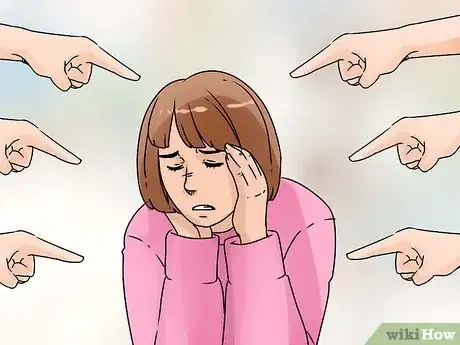



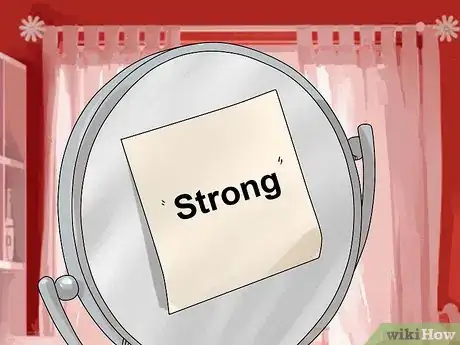
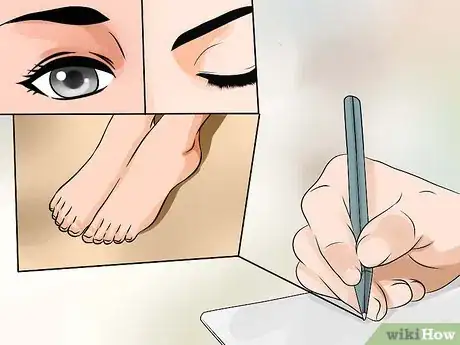




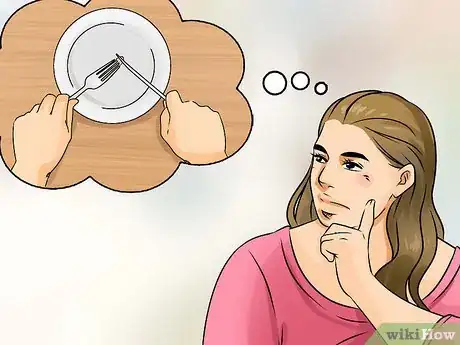
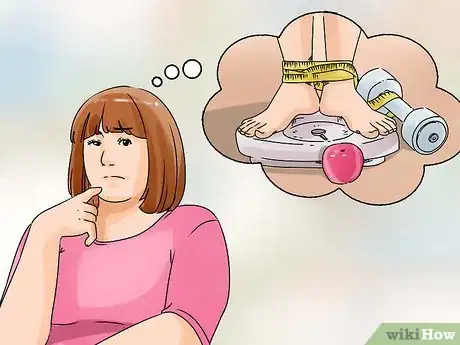














-Step-17.webp)















































